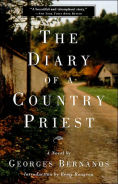Like Bread and Wine, this book was one that Dorothy Day reread frequently. It is a fictional diary of a young, unnamed priest assigned to his first parish: an isolated, rural village in 1930s France. As it opens, he stops on his rounds and looks out at the “miserable little houses huddled together under the desolate, ugly November sky” and is overwhelmed by his own inadequacy.
We can all of us manage to peel potatoes and feed pigs, provided we are given the orders to do so. But it is less easy to edify a whole parish with acts of obedience, than a mere community of monks. More especially since the parish would always be unaware of them, and the parish would never understand. [author’s emphasis]
This is, in fact, what happens to him. Mocked by the children, the target of gossip by the adults, he struggles with self-doubt and despair. He suffers from stomach pains that make it impossible to eat anything but bread dipped in wine, leading the village to think that he is a drunk. They take advantage of his unworldliness to cheat him and play pranks on him. From a peasant background, he feels awkward dealing with the inhabitants of the Château. He does find a few friends to confide in, particularly an older priest, the Curé de Torcy, but continues to feel like a failure. Even at the end of the book he calls himself “a very commonplace, very ordinary man.”
There are pros and cons to writing a novel in the form of a diary. Its main advantage is the reader’s intense immersion into the protagonist’s thoughts. However, this can become a liability if the protagonist does not hold our interest. I struggled with this novel for the first half of the book, bored by his endless complaints, his timidity, and the monotonous routine of his life.
What redeems the book is the second half, where we—or I at least—begin to understand that this is the story of a spiritual journey. He himself believes that he is becoming more and more incompetent; he cannot even pray anymore. Yet we see that he is actually beginning to have an effect on those around him.
Another problem with diaries is that we only told about events from the protagonist’s point of view and only what he chooses to share with his diary. Bernanos avoids this problem by having his priest copy down long speeches from other characters. While this could open the novel up to the dreaded “nothing is happening” accusation, in fact these voices are so individual and so forceful that I looked forward to these passages.
They are mainly extended conversations on the nature of God and other spiritual questions. While such questions are of little interest to me at this point in my life, I can see how they would be treasured by Dorothy Day, who converted to Catholicism in 1927. Also, in her Houses of Hospitality, I’m sure she sometimes had to deal with people as difficult as those in our priest’s parish. I expect she found strength in his humility and patience, and comfort in his experience of grace.
Have you read a book that has given you strength or comfort?

